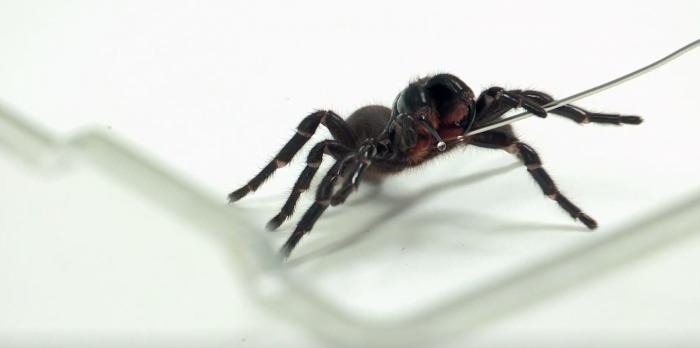While it may seem unlikely, the venom of this deadly funnel web spider may prove to be a valuable source of some life-saving drugs, including drugs that kill skin cancer and reduce brain damage in stroke patients. New research suggests that drug candidates built on molecules in this spider venom can block the "death signal" of a heart attack, which could provide a powerful new way for first responders to intervene.

The work, carried out by scientists at the University of Queensland in Australia, is actually building on a previous study in which they found a small protein with considerable potential in the venom of funnel web spiders. Through experiments in mice, the team found that using this particular protein after inducing a stroke significantly reduced the likelihood of brain damage, even within hours of stroke.
Professor Glenn King said: "We found that this small protein called Hi1a was surprisingly less damaging to the brain even when taken eight hours after a stroke attack. Testing Hi1a on heart cells also makes sense because, like the brain, the heart is one of the most sensitive organs in the body to blood loss and hypoxia. ”
To explore these possibilities, the scientists tested the drug on human heart cells, where they mimicd the stress at a heart attack. Eventually, the drug was found to block the so-called "death signal," which normally spreads to all heart cells during a heart attack.
Nathan Palpant, author of the study, notes: "After a heart attack, there is less blood flowing to the heart, which in turn leads to hypoxia in the myocardium. Lack of oxygen causes the cellular environment to become acidic, and the combination of these two factors signals death to heart cells. ”
The team found that Hi1a achieved this effect by blocking acid-sensing ion channels in the heart, which in turn blocked the transmission of the death signal, allowing more heart cells to survive. There is currently no drug that can block this signal of death, and there is no clinical drug that can save organs after a heart attack from this damage.
"For heart patients, our vision for the future is that Hi1a can be managed by first responders in ambulances, which will really change the health outcomes of heart disease," King said, "which is especially important in rural and remote areas of Australia where patients and treating hospitals are far apart and every second counts at this time." ”
In addition to potentially saving the lives of heart patients, the drug could also buy time by increasing the survival rate of heart cells to organ transplants. This can provide critical extra time for a transplanted heart after it has stopped beating and improve the chances of a successful transplant.
Scientists hope to build on these promising early results to study Hi1a as a treatment for stroke and heart disease through human clinical trials in the next two to three years.
Peter Macdonald said: "This will not only help thousands of heart patients around the world every year, but also increase the quantity and quality of donated hearts, which will give hope to those waiting for the transplant list." ”